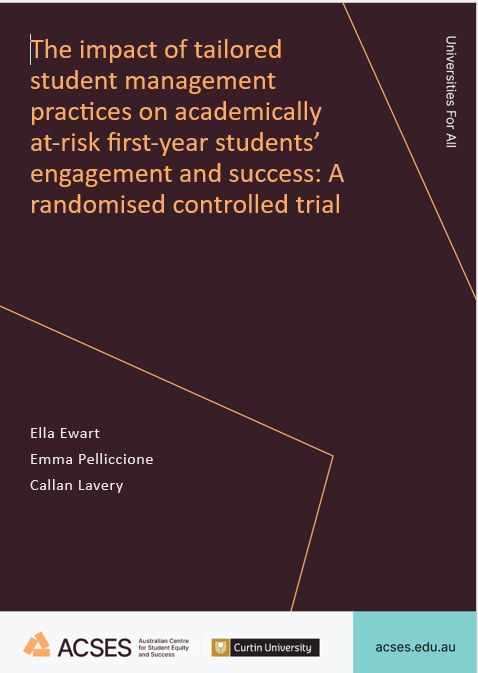Trial overview
What was trialed
The at-risk student management (AARSM) initiative identifies academically at-risk students as those on a weak academic trajectory, and provides them with targeted support.
The Student Support team identifies ‘at-risk students’ as those interacting with the online learning platform Blackboard fewer than 15 times in their first three weeks. After identification, the Student Advisor engages these students in multi-staged support relevant to their needs. The support includes identifying students’ individual needs, providing academic consultation, helping students set expectations and priorities, and referring students to other relevant support services.
The support is delivered either through digital channels (e.g. email, texts) or digital channels and phone support. These different levels of support, namely Tier 2 and 3 support (respectively) depend upon the student’s initial level of engagement with Blackboard.
The AARSM initiative is expected to benefit at-risk students, and result in improved assignment submission and grades, and improved engagement within the enrolled units. It is also expected that some at-risk students on a weak academic trajectory will withdraw from the unit prior to incurring any university fees.
What was found
The AARSM intervention resulted in greater unit withdrawals before census amongst those students who were identified as ‘medium risk’ (low levels of unit engagement, at baseline), but not for those students identified as ‘high risk’ (lowest or no engagement, at baseline). The benefit for these “medium risk” students, who were at risk of failing the unit, are that they will not incur university fees for these units. Other interventions may be required to support students at greatest risk, to ensure that they do not incur fees for courses that they cannot contribute to.
The AARSM intervention, delivered by professional staff, did not result in statistically significant improvements in course participation and engagement, nor improvements in assignment completions and grades for at-risk students. To improve engagement and grades within units, academics or those familiar with the course content may be better placed to ‘reach out’ to at-risk students to address the unit specific issues that they face.
How the trial was delivered
A parallel randomised controlled trial (RCT) was used to determine the impact of two approaches to applying AARSM support to at-risk students – digital communication-support for those at ‘medium-risk’ (Tier 2) and digital communications and phone support for those at ‘high-risk’ (Tier 3).
After first-year students were identified as academically ‘at-risk’, these students were randomised into one of four groups: those receiving Tier 2 or 3 interventions according to eligibility, and those who do not receive the intervention but may be receiving separate support available to them at Curtin University.
University administrative data was used to determine the impact of the intervention on: retention and withdrawals (enrolment data), participation and engagement (Blackboard engagement frequency), assignment completion and grades (Blackboard grade centre).
The trial was undertaken at Curtin University, in Perth Western Australia, during Semesters 1 and 2 in 2024.
Full report






